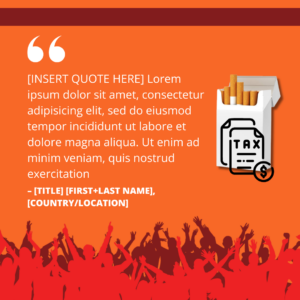Modifiable graphic in which you can put a quote from an expert or thought leader expressing support for your campaign.
Categories:
Tax and Decision-makers

Modifiable graphic in which you can put a quote from an expert or thought leader expressing support for your campaign.

The industry has a documented pattern of interfering with tax policies including pressuring public officials, subverting legislation, and presenting legal challenges to delay processes.
b. The tobacco industry’s claims on illicit trade and tax revenue loss are not credible. Tobacco companies are involved in or complicit in illicit trade.
c. The tobacco industry uses retailers, tobacco farmers, hospitality workers and others as puppets to fight tobacco tax increases when the reality is taxes have a neutral impact on overall employment.